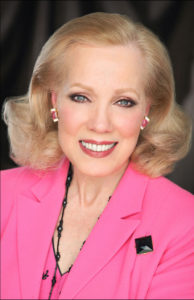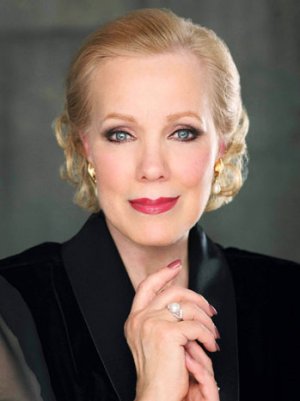(Note: This essay first appeared in the arts blog Practice Based Re/search written by Michael J. Masucci)
For the past two years, the middle of February has been a time of emotional depression for EZTV’s Kate Johnson and me. It was at this time of year when a true force of nature was senselessly taken from us. Her name was Zina Bethune.
Zina’s biography sounds like an exaggeration, or a fabrication, but it is all real. Indeed, there were many things about her life and multiple careers that she shared only with her family and close friends.
She was probably the most unique person I have ever known. As a young child, she was simultaneously a ballet protégé of George Balanchine and an actor performing serious roles such as Tennessee Williams’s This Property is Condemned. Wise well beyond her young years, as a teenager, she starred for several seasons on TV; playing adult roles. During this time, she was also doing guest appearances such as singing and dancing on the Judy Garland Show, acting in Broadway plays, and showing her more comedic side doing guest spots on celebrity game shows.
During this period, at the top of her fame, she agreed to star in a young and unknown NYU film student’s first feature film. That young film student was named Martin Scorsese.
It seemed inevitable that Zina was destined to become one of the biggest stars in Hollywood. But fate had a different script written for her to play out. During these same early years, she was diagnosed with a number of genetic medical conditions, the prognosis of which was devastating. She was told that by her early 20’s, she would become wheelchair-bound and would never walk again. No greater curse can be imagined for a dancer.
What was to happen is a story so incredible that some ignorant people have even questioned its truth. She did, for a while, become confined to a wheelchair. During those several years, she researched experimental surgical procedures. She contacted a number of physicians seeking someone willing to try the impossible. She then found such a surgeon in Denmark. He performed an experimental procedure in which the top of her femurs were severed and then put back in reverse. This allowed a return to mobility that she had lost. After much painful physical therapy, multiple additional surgeries, and through the use of extremely restricted leg tights, she not only stood again but retrained herself to dance.

Zina returned to her professional career, creating one of the first dance companies to use multimedia projections. Simultaneously, while also taking the occasional acting role, she created Dance Outreach (later renamed Infinite Dreams ), to teach children with physical challenges the arts of dance and theater. She then later partnered with many of them in dance performances.
 She danced with her partners; some on crutches and some in wheelchairs. Among such numerous dance concerts included a performance for the White House at the Kennedy Center, as well as in Europe for the United Nations. On telethons and at the Los Angeles Music Center, she broke people’s hearts time and time again, forcing them in the most proactive of ways, to confront their own personal biases about the physically challenged, or as she preferred to call them “the specially abled”.
She danced with her partners; some on crutches and some in wheelchairs. Among such numerous dance concerts included a performance for the White House at the Kennedy Center, as well as in Europe for the United Nations. On telethons and at the Los Angeles Music Center, she broke people’s hearts time and time again, forcing them in the most proactive of ways, to confront their own personal biases about the physically challenged, or as she preferred to call them “the specially abled”.
 I was recommended to Zina by two people: one multimedia pioneer Ron Hays, who was collaborating with Zina, and also by a dancer and Zina’s assistant director, Laura Feder Behr. Zina called me up at EZTV and asked if I’d like to collaborate with her on a live multimedia art & technology dance piece she was calling “Galileo, Jupiter, Apollo”. It became the first of a number of such productions starting in the mid-1980’s on themes involving art, science, bias, struggle, and triumph.
I was recommended to Zina by two people: one multimedia pioneer Ron Hays, who was collaborating with Zina, and also by a dancer and Zina’s assistant director, Laura Feder Behr. Zina called me up at EZTV and asked if I’d like to collaborate with her on a live multimedia art & technology dance piece she was calling “Galileo, Jupiter, Apollo”. It became the first of a number of such productions starting in the mid-1980’s on themes involving art, science, bias, struggle, and triumph.
On and off for the next 20 years, I collaborated with her on a number of elaborate multimedia productions. She would tell me, “Art transcends limitations,’ and compelled me to squeeze every ounce of production value from the tiny or non-existent budgets that the video projections would have.
I also accompanied her in 1988, six months before Tiananmen Square demonstrations, on a trip to China where her grand-uncle, Dr. Norman Bethune, was a hero. Those amazing weeks of cross-cultural discovery should and will be a separate essay in itself.
Throughout the following decades, she continued building Infinite Dreams; expanding it from first dozens to thousands of students.
In her late forties, she starred and danced again on Broadway in Tommy Tune’s Grand Hotel. She continued to tell me that “art transcends limitations,” an adage she proved time and time again.
I’ve been very lucky to have gotten to know so many amazing persons during my life; some famous, many not so much. Fame never impressed me; in fact I often believed it was a curse instilled on people through the cosmic lottery. That cosmic lottery went terribly wrong one February night.
It was well after midnight that choreographer Donna Sternberg emailed Kate Johnson, bringing the news of Zina’s passing. Kate immediately told me. It was late at night and a confirmation was hard to get. The next morning, the local TV was covering the news. In shock, Kate and I drove to Zina’s office, holding flowers and just standing at the doorway crying. The office manager, Tommy, suggested we go to her house nearby and see her husband Sean Feeley.
Her mother, Ivy, contacted me and asked if we would do the memorial video. It was seriously the hardest assignment I have ever taken. There were a number of other people who wanted to do the video but Ivy insisted on me. I enlisted Kate Johnson to co-create it together.
For three weeks, Kate and I sat in the editing room, literally crying out loud, while watching the numerous clips of her multifaceted career. The result here is a 16-minute introductory glimpse into an extraordinary life. It starts as a typical memorial service video would, but then quickly unfolds into an amazing life story:
At the evening-long memorial event where we showed the video, many actors, friends, and members of the dance community performed. Apparently, some of these people only knew certain aspects of her life. Many people came up to Kate and I afterwards and would say, “I knew Zina for 20 years and never heard about half of what you showed”. The truth is, we could have easily made the memorial film twice as long and we still would have been forced to leave many things out.
Kate Johnson and I have promised her family, her husband Sean, and her mother Ivy, along with her closest friend Paula Woodley, that we will complete a feature-length documentary on Zina using the 16-minute video as a beginning. It is the one film that we would have never wanted to do but it is also the one film that we are probably best qualified to. When it does get completed, I hope that it is widely seen, not for my own benefit, but for Zina.
She was unstoppable with a kind of genius that was neither off-putting nor self-serving. At the time of her death, she and her Infinite Dreams teachers had already taught over 8,000 physically challenged students. That work will continue. I could go on and on about her. Kate Johnson and I loved her, as did anyone with the privilege of having known her. And as this year’s second anniversary of her passing approaches, it is time for us to begin to follow-through on our commitment to her and her loved ones, by producing a documentary film about her life. It has simply been too hard to begin what will, of course, be a very difficult journey. But now that journey must be taken.

In a world where silly cat videos go viral, Zina’s story may be too complex for casual observance. The achievements she had may be too off-putting to those of us who have done so much less with our lives. Her life never made a good ‘sound-bite’ or was hard to deliver as an ‘elevator pitch’. But I hope her life inspires us to try harder, go farther, and imagine greater things than we had previously. It has for me. And I am always reminded, through example, how much more there is for me to learn, to practice and, investigate.
She was also always an animal lover; all kinds of animals. One late night in mid-February, while driving home from a rehearsal, she stopped to help an injured possum on the road. She was then killed by a hit-and-run driver.
Her archives will soon be part of the permanent collection at UCLA.
